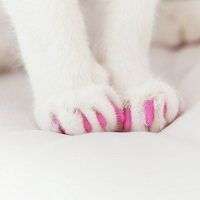
Cat declawing is possibly one of the most controversial of all animal surgeries. Cats scratch to mark territory and to keep their claws in top condition, but the scratching behavior can challenge the bond between a cat and his owner. Felines, especially young cats, often play rough and scratch their owners or other animals. Scratching behavior also ruins furniture, flooring, draperies, and clothes in many cases.
While declawing is a permanent solution to these problems, it is a surgical procedure requiring anesthesia and removal of the end of the digit, including the nail with the attached bone. National veterinary medical associations state that an owner should consider declawing a cat only after exhausting all other solutions to the scratching behavior, or when scratching increases the risk for spreading infectious disease between the cat and people in the house.
Non-surgical alternatives to declawing include:
- Providing appealing scratching posts
- Regular claw care including trimming every 1 to 2 weeks
- Plastic nail caps
Scratching Posts
A cat owner can purchase commercially made scratching posts or make one at home. Scratching posts use cardboard boxes, lumber, logs, or carpet scraps attached to a sturdy object. Cats like the backing of the carpet best, so put the pretty, soft side on the inside. Any scratching posts should be securely anchored, and the scratching post should be taller than the cat so she can really stretch out when she scratches. Cat owners should use positive reinforcement to encourage the cat to use scratching posts instead of furniture.
Nail Caps
Temporary synthetic nail caps are also an effective alternative to declawing. There are a variety of synthetic nail caps on the market. These colorful caps cover the cat’s natural nail, protecting skin and furniture when she makes scratching motions. Nail caps will grow off, requiring replacement every four to six weeks. Your groomer or veterinary office can apply the first set of nail caps, but it is also possible to apply them at home.
There are surgical alternatives to conventional declawing but these methods also involve removal of tissue from a cat’s toes. These alternatives include laser declawing and tendonectomy. Laser declawing uses laser energy instead of a scalpel or guillotine blade. Tendonectomy removes the tendon that allows cats to control the claw but leaves the claw intact.
Many cats’ scratching problems can be resolved with non-surgical solutions before declawing must be considered. Non-surgical methods carry a very low risk, if any, for complications. Contact your veterinarian for more information about declawing and non-surgical alternatives.
Sources:
"Declawing of Domestic Cats." Declawing of Domestic Cats. American Veterinary Medical Association. Web.
